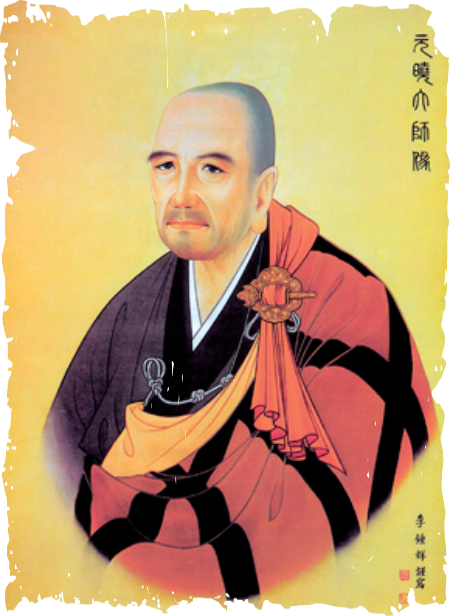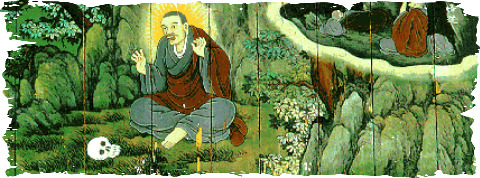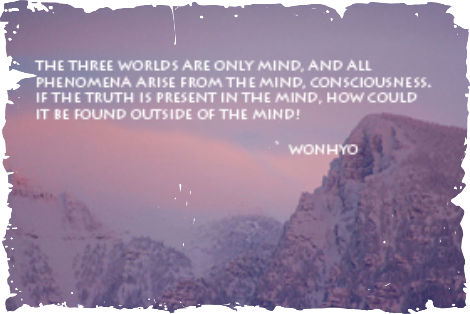Pattern History - Won-Hyo Tul
Won-Hyo (617-686 A.D.) born as Sol-Sedang was said to be wise from birth. The pen-name Won-Hyo meaning ‘Dawn’ was derived from his nickname (Sedak), which had the same meaning. In Korea people often had many names: an official name, nickname, pen-name, pseudonym, posthumous title and monks or apprentices were often awarded another name from their Master. At 20 years old he became a Buddhist monk and turned his home into a temple. Ilyon claims that ‘Won-Hyo’s native home, Pulji (Buddha Land), his temple’s name, Ch’ogae (First Opening) and his religious name Won-Hyo (Breaking Dawn) all refer to the first dawning of the Buddhist faith on earth.’
Buddhism had been introduced to Silla previously, but had been confined to the Royal family and rejected by the people. With many scrolls that needed to be read only available in Chinese it was not accessible to the general population of the time. Buddhist monks traditionally journeyed to China to complete their study, but it is recorded that Won-Hyo set out on this journey but did not complete it, thus becoming the only monk in his day who did not study in China.
Won-Hyo wrote around 240 volumes covering 100 different types of literature, unfortunately constant invasions mean that much of historical value has been lost and only 25 volumes of 20 of his works survive to this day. One of Won-Hyo’s works ‘Sipmun Hwajong-Non’ or ‘Treatise on the Harmonious Understanding of the Ten Doctrines’ was a plea for the uniting of the Buddhist sects. Won-Hyo’s posthumous title ‘Hwajong Kuksa’ was derived from this work.
After a Royal invitation to reside at the palace, Won-Hyo married the widowed princess Kwa, a daughter of King Muyol.
The King approved this union even though at this time widows were forbidden to remarry, because he felt that any child produced would be of great benefit to the kingdom. Their son Sol-Chong became one the Ten Confucian Sages of the Silla era. Sol-Chong developed a form of translation for Chinese texts, the Idu system simplifying Chinese characters into phonetic signs which could convey the Korean language; this made them more accessible to the general population. In 661 A.D. Won-Hyo began the ‘Chongto’ or Pure Land Sect, Won-Hyo believed that salvation could be found through prayer alone, this sect opened Buddhism up to the general populace and in 662 A.D. he left the priesthood to travel the country teaching the people.
Ilyon records Won-Hyo performing the ‘Gourd dance’ and composing a song which enabled him to bring his teaching to even the most despised of the low born people; he also records that his marriage to a widow, which was forbidden meant that he had to leave the priesthood. In 668 A.D. the Three Kingdoms of Korea were finally united under Silla.
Won-Hyo’s efforts made Buddhism finally available to all Koreans and he died in 686 A.D.
Buddhism had been introduced to Silla previously, but had been confined to the Royal family and rejected by the people. With many scrolls that needed to be read only available in Chinese it was not accessible to the general population of the time. Buddhist monks traditionally journeyed to China to complete their study, but it is recorded that Won-Hyo set out on this journey but did not complete it, thus becoming the only monk in his day who did not study in China.
Won-Hyo wrote around 240 volumes covering 100 different types of literature, unfortunately constant invasions mean that much of historical value has been lost and only 25 volumes of 20 of his works survive to this day. One of Won-Hyo’s works ‘Sipmun Hwajong-Non’ or ‘Treatise on the Harmonious Understanding of the Ten Doctrines’ was a plea for the uniting of the Buddhist sects. Won-Hyo’s posthumous title ‘Hwajong Kuksa’ was derived from this work.
After a Royal invitation to reside at the palace, Won-Hyo married the widowed princess Kwa, a daughter of King Muyol.
The King approved this union even though at this time widows were forbidden to remarry, because he felt that any child produced would be of great benefit to the kingdom. Their son Sol-Chong became one the Ten Confucian Sages of the Silla era. Sol-Chong developed a form of translation for Chinese texts, the Idu system simplifying Chinese characters into phonetic signs which could convey the Korean language; this made them more accessible to the general population. In 661 A.D. Won-Hyo began the ‘Chongto’ or Pure Land Sect, Won-Hyo believed that salvation could be found through prayer alone, this sect opened Buddhism up to the general populace and in 662 A.D. he left the priesthood to travel the country teaching the people.
Ilyon records Won-Hyo performing the ‘Gourd dance’ and composing a song which enabled him to bring his teaching to even the most despised of the low born people; he also records that his marriage to a widow, which was forbidden meant that he had to leave the priesthood. In 668 A.D. the Three Kingdoms of Korea were finally united under Silla.
Won-Hyo’s efforts made Buddhism finally available to all Koreans and he died in 686 A.D.

Above: Video explaining how Won-Hyo found enlightenment.




